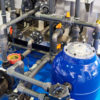Owning a pool offers endless enjoyment, but maintaining it can be time-consuming and expensive. Many homeowners and property managers are turning to pool automation to simplify pool care, improve efficiency, and reduce long-term costs. But is pool automation worth it? With advancements in technology, automation provides more than just convenience – it enhances water quality, reduces energy use, and extends the life of pool equipment.
What Is Pool Automation?
Pool automation refers to the use of smart technology to regulate and control various pool functions. A pool automation system integrates with existing equipment to automate tasks such as filtration, chemical distribution, heating, and lighting. Instead of manually adjusting settings or testing water levels, pool owners can monitor and control their system remotely via a smartphone app or a central control panel.
The Cost of Pool Automation vs. Manual Maintenance
The cost of swimming pool automation depends on the system’s features, level of integration, and installation requirements. Basic setups that control a single component – such as a pool pump or pool heater – are generally more affordable, while comprehensive systems that automate multiple functions, including filtration, lighting, and chemical balancing, require a larger investment.
Although the upfront cost is higher than traditional pool maintenance, automation can lead to long-term savings. By optimizing energy use, reducing chemical waste, and extending the lifespan of pool equipment, automated systems help lower operational expenses over time. Many pool owners find that the reduction in maintenance time and ongoing costs makes automation a worthwhile investment.
Return on Investment for Pool Automation
Many homeowners wonder how long it takes for a pool automation system to pay for itself. The return on investment depends on factors such as pool size, climate, and energy costs, but many users begin to see savings within three to five years. Energy-efficient equipment reduces electricity bills, while automated chemical monitoring minimizes unnecessary chemical use. These savings accumulate over time, offsetting the initial installation costs.
In addition to direct cost savings, automation can add value to a home. More and more buyers are seeking smart home features, and an automated pool system can be a strong selling point. It’s easy to see why a well-maintained, easy-to-manage pool would be more appealing to some prospective buyers, potentially increasing a property’s marketability and resale value.
Technological Advancements in Pool Automation
Recent innovations have made pool automation systems even more efficient and user-friendly. AI-driven chemical monitoring automatically adjusts pH and chlorine levels based on real-time pool water conditions. Robotic pool cleaners now integrate seamlessly with automation systems, handling debris removal with minimal intervention.
Connectivity has also improved, allowing pools to be controlled through voice assistants like Alexa and Google Home. The future of automation includes more AI-driven diagnostics, deeper smart home integration, and enhanced solar-powered features to further improve efficiency.
Energy Efficiency and Eco-Friendly Benefits
A major advantage of automation is its impact on energy efficiency. Traditional pool equipment often runs longer than necessary, leading to excessive electricity consumption. Smart scheduling eliminates this issue by running pumps and heaters only when needed. Variable-speed pumps – commonly found in automated systems – can significantly reduce energy use compared to single-speed models.
Automation also supports eco-friendly maintenance by reducing chemical waste. Smart dispensers distribute pool cleaning chemicals more precisely, preventing overuse and minimizing environmental impact. Some pool owners pair automation with solar-powered heating and filtration, further lowering their carbon footprint while maintaining comfortable swimming conditions.
Safety Features and Enhancements of Pool Automation
Automation offers more than just convenience – it also enhances pool safety with smart security features. Motion sensors detect movement around the pool, sending real-time alerts to homeowners. Automated pool covers provide an added layer of protection, preventing accidental falls while also conserving heat and reducing water loss.
Water level sensors monitor fluctuations, preventing overflows or unsafe conditions. Compared to traditional safety measures, automated systems provide continuous protection, reducing risks without requiring constant supervision.
Key Considerations for Pool Automation
While the upfront cost is higher than traditional pool maintenance, the long-term benefits of pool automation can make it a practical investment. As smart home technology continues to evolve, automation is becoming more accessible and widely adopted. The ability to automate pool equipment not only simplifies maintenance but also aligns with future innovations in smart home technology.
Going forward, any pool owner looking for a balance of convenience, efficiency, and long-term savings may find automation to be a worthwhile upgrade.



